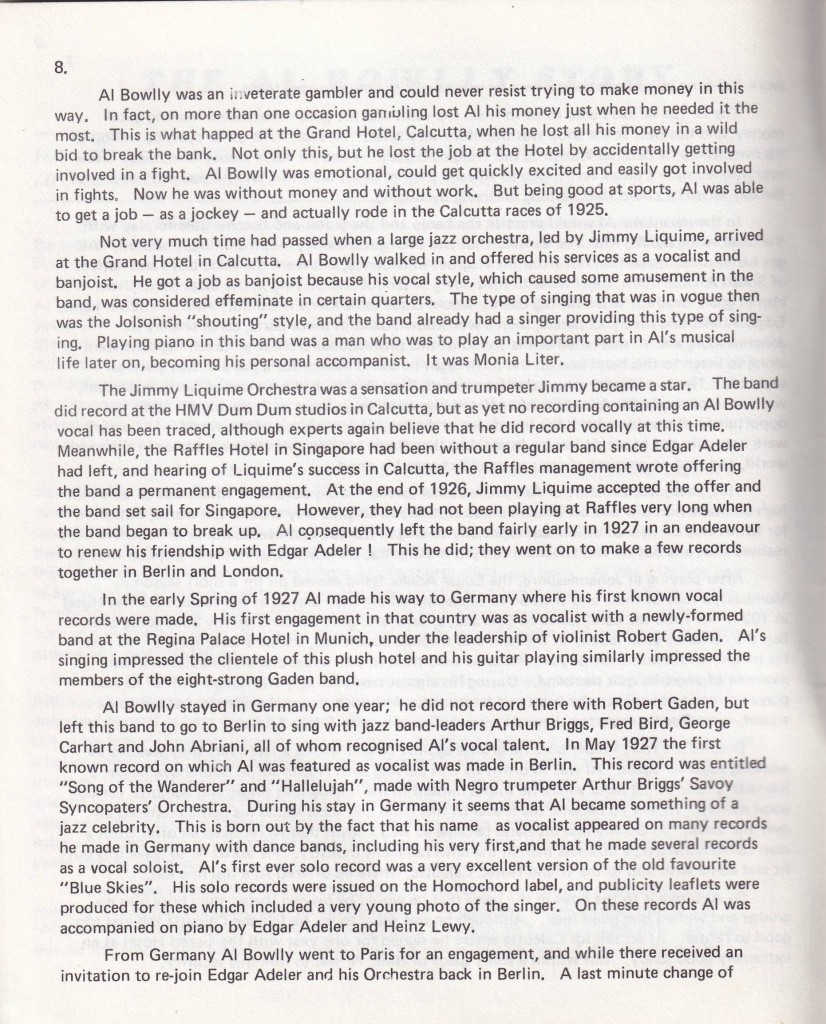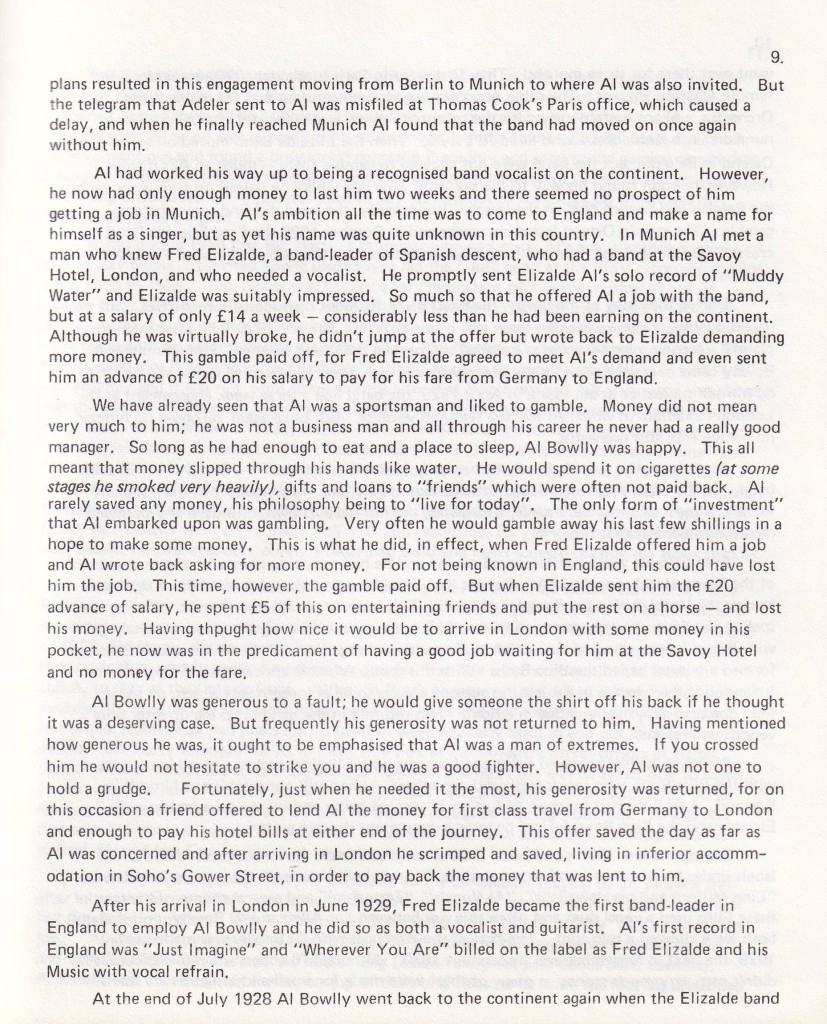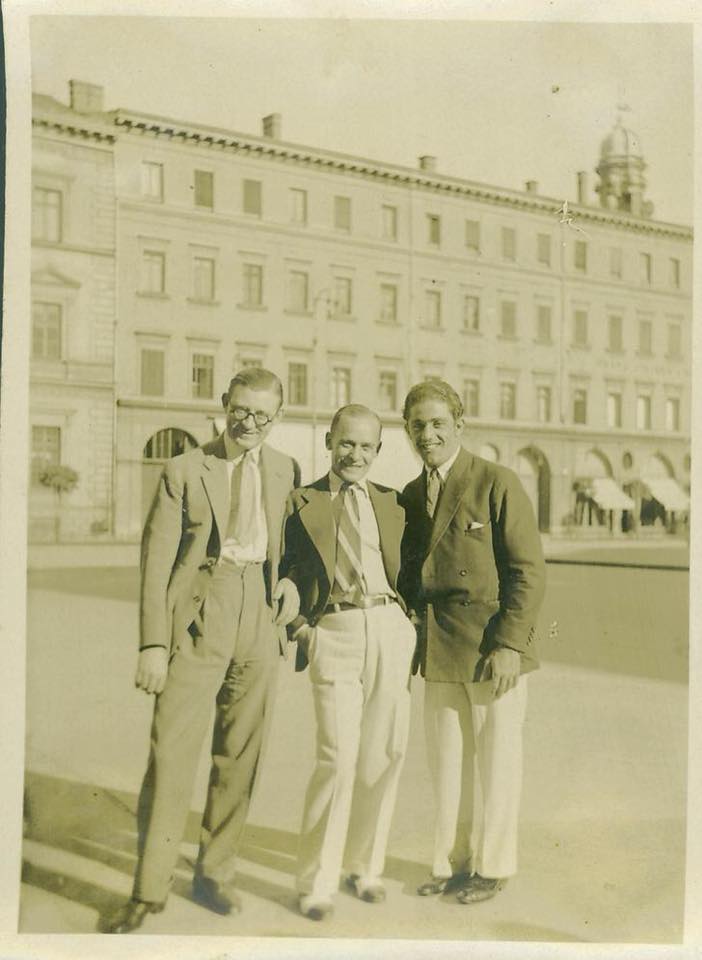FOR THE FIRST TIME – THE FULL FACTUAL STORY OF AL BOWLLY AND HIS LIFE OF MUSIC AND SONG.
WRITTEN AND RESEARCHED BY RAY PALLETT (1975)

Al Bowlly was an inveterate gambler and could never resist trying to make money in this way . In fact, on more than one occasion gambling lost Al his money just when he needed it the most .This is what happened at the Grand Hotel, Calcutta, when he lost all his money in a wild bid to break the bank. Not only this, but he lost the job at the Hotel by accidentally getting involved in a fight. Al Bowlly was emotional, could get quickly excited and easily got involved in fights. Now he was without money and without work. But being good at sports, Al was able to get a job as a jockey – and actually rode in the Calcutta races of 1925.
Not very much time had passed when a large jazz orchestra, led by Jimmy Liquime, arrived at the Grand Hotel in Calcutta. Al Bowlly walked in and offered his services as a vocalist and banjoist . He got a job as banjoist because his vocal style, which caused some amusement in the band, was considered effeminate in certain quarters, The type of singing that was in vogue then was the Jolsonish “shouting” style, and the band already had a singer providing this type of singing . Playing piano in this band was a man who was to play an important part in Al’s musical life later on, becoming his personal accompanist. It was Monia Liter.
The Jimmy Liquime orchestra was a sensation and trumpeter Jimmy became a star. The band did record at the HMV Dum Dum studios in Calcutta, but as yet no recording containing an Al Bowlly vocal has been traced, although experts again believe that he did record vocally at this time.
Meanwhile, the Raffles Hotel in Singapore had been without a regular band since Edgar Adeler had left, and hearing of Liquime’s success in Calcutta, the Raffles-management wrote offering the band a permanent engagement, At the end of 1926 Jimmy Liquime accepted the offer and the band set sail for Singapore. However, they had not been playing at Raffles very long when the band began to break up. Al consequently left the band fairly early in 1927 in an endeavour to renew his friendship with Edgar Adeler . This he did; they went on to make a few records together in Berlin and London.
ln the early spring of 1927 Al made his way to Germany where his first known vocal records were made .His first engagement in that country was as vocalist with a newly-formed band at the Regina Palace Hotel in Munich, under the leadership of violinist Robert Gaden. Al’s singing impressed the clientele of this plush hotel and his guitar playing similarly impressed the members of the eight-strong Gaden band. Al Bowlly stayed in Germany one year; he did not record there with Robert Gaden, but left this band to go to Berlin to sing with jazz band-readers Arthur Briggs, Fred Bird, George Carhart and John Abriani, all of whom recognised Al’s vocal talent.
In May 1927 the first known record on which Al was featured was made in Berlin. This record was entitled “Song of the Wanderer” and “Hallelujah , made with Negro trumpeter Arthur Briggs, Savoy Syncopaters’ orchestra.
During his stay in Germany it seems that Al became something of a jazz celebrity .This is born out by the fact that his name as vocalist appeared on many records he made in Germany with dance bands, including his very first, and that he made several records as a vocal soloist .Al’s first ever solo record was a very excellent version of the old favourite “Blue Skies”‘ His solo records were issued on the Homochord label, and publicity leaflets were produced for these which included a very young photo of the singer. on these records Al was accompanied on piano by Edgar Adeler and Heinz Lewy.
From Germany Al Bowlly went to Paris for an engagement, and while there received an invitation to re-join Edgar Adeler and his orchestra back in Berlin. A last minute change of plans resulted in this engagement moving from Berlin to Munich to where Al was also invited. But a telegram that Adeler sent to Al was misfiled at Thomas Cook’s Paris office, which cause a delay and when he finally reached Munich Al found that the band had moved on once again without him
Al had worked his way up to being a recognised band vocalist on the continent. However , now had only enough money to last him two weeks and there seemed no prospect of him getting a job in Munich. Al’s ambition at the time was to come to England and make a name for himself as a singer, but as yet his name was quite unknown in this country. ln Munich Al met a man who knew Fred Elizalde, a band-leader of Spanish descent, who had a band at the Savoy hotel, London, and who needed a vocalist. He promptly sent Elizalde Al’s solo record of Muddy Waters” and Elizalde was suitably impressed. So much so that he offered Al a job with the band, but at a salary of only £14 a week – considerably less than he had been earning on the continent. Although he was virtually broke, he didn’t jump at the offer but wrote back to Elizalde demanding more money .This gamble paid off, for Fred Elizalde agreed to meet Al’s demand and even sent him an advance of £20 on his salary to pay for his fare from Germany to England.
We have already seen that Al was a sportsman and liked to gamble, Money did not mean very much to him; he was not a business man and all through his career he never had a really good manager. So long as he had enough to eat and a place to sleep, Al Bowlly was happy. This all meant that money slipped through his hands like water, He would spend it on cigarettes ( at some stages he smoked very heavily), gifts and loans to “friends” which were often not paid back. Al rarely saved any money, his philosophy being to live for today . The only form of investment that Al embarked upon was gambling. Very often he would gamble away his last few shillings in a hope to make some money. This is what he did, in effect, when Fred Elizalde offered him a job and Al wrote back asking for more money. For not being known in England, this could have lost him the job .This time, however, the gamble paid off. But when Elizalde sent him the £20 advance of salary, he spent £5 of this on entertaining friends and put the rest on a horse – and lost
his money . Having thought how nice it would be to arrive in London with some money in his pocket, he now was in the predicament of having a good job waiting for him at the Savoy Hotel and no money for the fare.
Al Bowlly was generous to a fault; he would give someone the shirt off his back if he thought it was a deserving case. But frequently his generosity was not returned to him. Having mentioned how generous he was, it ought to be emphasised that Al was a man of extremes . If you crossed him he would not hesitate to strike you and he was a good fighter. However, Al was not one to hold a grudge, Fortunately, just when he needed it the most, his generosity was returned, for on this occasion a friend offered to lend Al the money for first class travel from Germany to London and enough to pay his hotel bills at either end of the journey. This offer saved the day as far as Al was concerned and after arriving in London he scrimped and saved, living in inferior accommodation in Soho’s Gower street, in order to pay track the money that was lent to him.
After his arrival in London in June 1929, Fred Elizalde became the first band leader in England to employ Al Bowlly and he did so as both a vocalist and guitarist. Al’s first record in England was “Just imagine” and “Wherever You Are” billed on the label as Fred Elizalde and his Music with vocal refrain.


